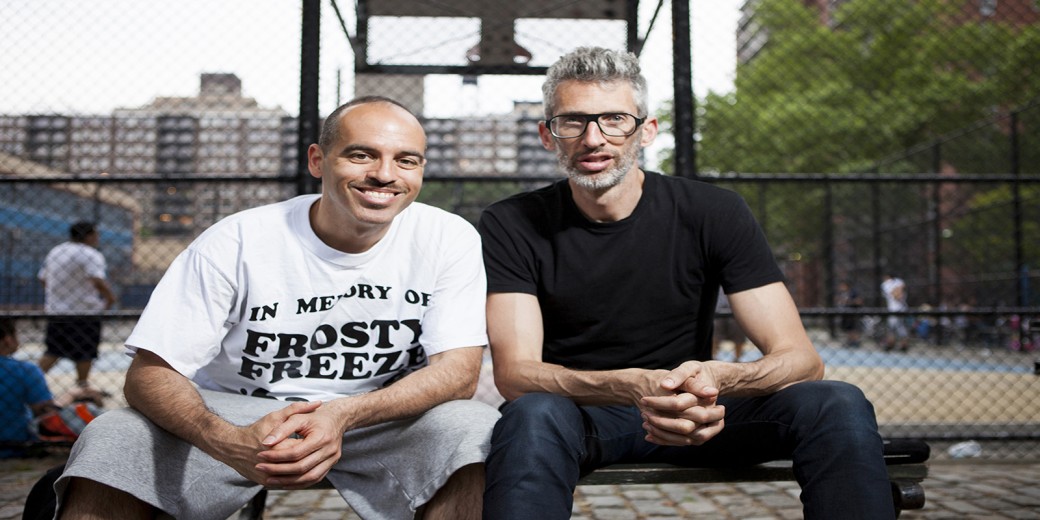It’s opening night and two friends share headphones bumping to the same rhythm. “Yo this was ‘94!” one says walking toward his seat while the other follows, still in the zone. The crowd blended together, all for the love of hip-hop, at the theatrical premiere of Stretch and Bobbito: A Film About Radio That Changed Lives. Featuring art by Brooklyn-based calligraphy artist (and original listener) José Parlá, the film takes you back to the dial, after the static and before the news, on the most influential hip-hop radio show ever.
Before the spotlight hit your favorite MC’s, the “On Air” light from Columbia University’s WKCR 89.9 FM was what they saw. Hosted by New Yorkers Adrian Bartos aka Stretch Armstrong and Robert “Bobbito” Garcia, the show was a freestyle haven for then aspiring MC’s including Jay-Z, Big L, Nas, Eminem, Talib Kweli, KRS One, Q-Tip and Big Pun, to name a few. The show’s eight-year run captured classic music moments like the ’95 Big L vs. Jay-Z battle; Nas promoting Illmatic three years before its release; and the remarkable flow of 16-year-old Notorious B.I.G in 1991. The DJ’s changed the lives of everyone from the talent who walked in to the listeners who called to the inmates who wrote in.
Sitting back in the director’s chair since his wildly popular film Doin’ It In The Park, Bobbito’s still as hip hop as ever as he screams his gritty “What’s up New York?!” “People felt like they knew me because we were vulnerable on the air ourselves so people felt comfortable being vulnerable with us.” Stretch, now rocking salt-and-pepper waves, still has a love affair with hip-hop. “Me and Bobbito have both done work with other people, but making this film has been as much fun as doing the show in those first few years.”
‘LLERO was on the scene at Brooklyn Academy of Music for the premiere and took part of the conversation about how these two Latino hip hop heads not only shaped hip hop history but took control of their own legacy. Check out what Bobbito and Stretch had to share after the jump.
Jay-Z with Stretch & Bobbito listening to his rhymes on the show in the 90’s from a cassette player. Photo by Matt McGinley
‘LL: What prompted the idea for the film?
Bobbito: Omar Acosta [the producer] is really the starting point. After reaching out to Stretch, the goal was to try and finish the film in time for our 25th anniversary. We started the show October 25, 1990 so we wanted to release the film in October 2015.
‘LL: Did you run into any obstacles in creating this movie?
Stretch: We certainly had a lot of issues and problems to solve particularly with the fact that we didn’t have archive video footage of many of the interviews and performances that we wanted to illustrate but José Parla just went loose and went totally abstract.
‘LL: Let’s talk about the vibe that was in that room from one to five every Thursday. Those listeners felt like, ‘They’re having fun so I’m having fun listening to them.’
Stretch: We were never anointed by anybody. We weren’t interns. We weren’t understudies to anyone. I got the show at Columbia because I was a student and there we were in the middle of New York City. 1990. Doing a hip-hop show. We were two fans that were sort of thrust into the middle of this. And it was just a weekly thrill.
Bobbito: It was just the energy of what was going on. It invigorated you every single week, as long as there was great music. Shout out to the listeners. It was ridiculous. People were calling up all through the night, like “What record is that!?” or “Yo I just shot somebody!”
‘LL: Sometimes in history Latinos are not credited as being part of the hip-hop movement. Do you think this movie changes that perception?
Stretch: People who really know about hip-hop know that it’s a very multi-dimensional sphere, with people from all colors, races, backgrounds. Latinos have played a role since the very beginning in the late 60’s and 70’s, and the film shows that.
‘LL: It’s amazing to hear MCs say that they were scared to come to the show. But they were recognizing that this was a moment of being official. How you think this show shaped some of hip hop?
Stretch: We had a very passionate, dedicated listenership. That’s what it was about. Ears and eyes were on you if you were up there. If you were gonna mess up or not come correct, that would not be a good look.

